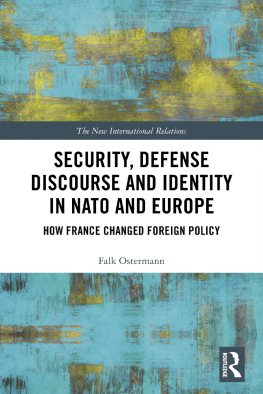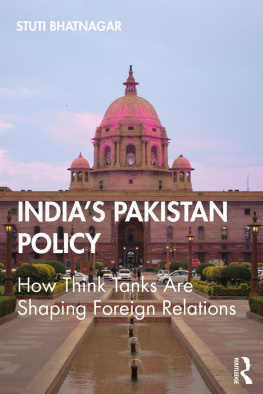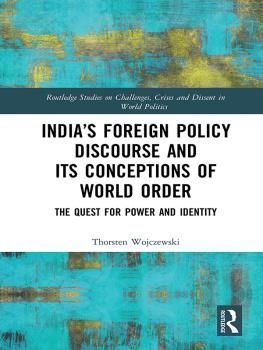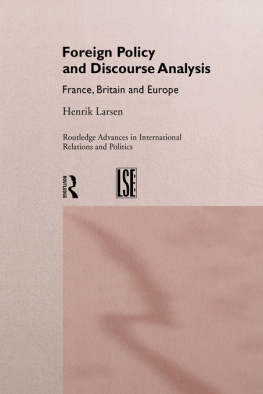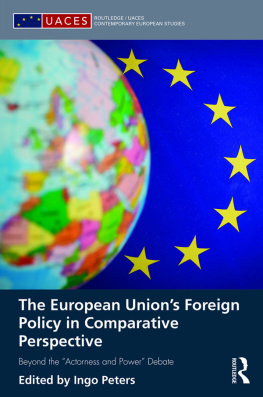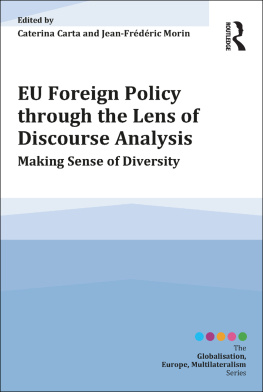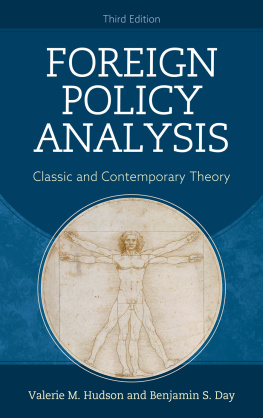Security, Defense Discourse and Identity in NATO and Europe
Analyzing changes in the role and place of NATO, European integration, and Franco-American relations in foreign policy discourse under Presidents Jacques Chirac and Nicolas Sarkozy, this book provides an original perspective on French foreign policy and its identity construction.
The book employs a novel research design for the analysis of foreign policies, which can be used beyond the case of France, by combining the discourse theory of the Essex School with Interpretive Policy Analysis to examine political ideas and how they are organized into a foreign policy identity. On these grounds, the volume undertakes a comparative analysis of parliamentary and executive discourse of President Chiracs failed attempt at NATO reintegration in the 1990s, Sarkozys successful attempt in the 2000s, and the Libyan War. Ostermann depicts French foreign policy and identity as turning away from the European Union, atlanticizing, and losing its American nemesis. As a result, France uses a much more pragmatic, de-unionized, and pro-American strategy to implement foreign policy objectives than before.
Offering a new and innovative explanation for a major change in French foreign policy and grand strategy, this book will be of great interest to scholars of NATO, European defense cooperation, and foreign policy.
Falk Ostermann is Assistant Professor of International Relations at the University of Giessen, Germany. He specializes in French security and defense policy and studies NATO, European defense, identity, and discourse analysis. He has published, inter alia, in European Security, International Relations, and West European Politics.
The New International Relations
Edited by Richard Little
University of Bristol
Iver B. Neumann
Norwegian Institute of International Affairs (NUPI), Norway
and
Jutta Weldes
University of Bristol
The field of international relations has changed dramatically in recent years. This new series will cover the major issues that have emerged and reflect the latest academic thinking in this particular dynamic area.
Russia and the Idea of Europe 2nd Edition
A Study in Identity and International Relations
Iver B. Neumann
Memories of Empire and Entry into International Society
Views from the European Periphery
Edited by Filip Ejdus
Great Power Multilateralism and the Prevention of War
Debating a 21st Century Concert of Powers
Edited by Harald Mller and Carsten Rauch
De-Constructing the Dynamics of World-Societal Order
The Power of Governmentality in Palestine
Jan Busse
Raymond Aron and International Relations
Edited by Olivier Schmitt
Coercive Sanctions and International Conflicts
A Sociological Theory
Mark Daniel Jaeger
Security, Defense Discourse and Identity in NATO and Europe
How France Changed Foreign Policy
Falk Ostermann
Special Relationships in World Politics
Inter-state Friendship and Diplomacy after the Second World War
Kristin Haugevik
Security, Defense Discourse and Identity in NATO and Europe
How France Changed Foreign Policy
Falk Ostermann
First published 2019
by Routledge
2 Park Square, Milton Park, Abingdon, Oxon OX14 4RN
and by Routledge
711 Third Avenue, New York, NY 10017
Routledge is an imprint of the Taylor & Francis Group, an informa business
2019 Falk Ostermann
The right of Falk Ostermann to be identified as author of this work has been asserted by him in accordance with sections 77 and 78 of the Copyright, Designs and Patents Act 1988.
All rights reserved. No part of this book may be reprinted or reproduced or utilized in any form or by any electronic, mechanical, or other means, now known or hereafter invented, including photocopying and recording, or in any information storage or retrieval system, without permission in writing from the publishers.
Trademark notice: Product or corporate names may be trademarks or registered trademarks, and are used only for identification and explanation without intent to infringe.
British Library Cataloguing-in-Publication Data
A catalogue record for this book is available from the British Library
Library of Congress Cataloging-in-Publication Data
A catalog record has been requested for this book
ISBN: 978-1-138-58540-9 (hbk)
ISBN: 978-0-429-50528-7 (ebk)
Typeset in Times New Roman
by Wearset Ltd, Boldon, Tyne and Wear
To Dietlind, Helmut, and Katharina
One strain of the New International Relations that emerged as the Cold War was coming to an end focused on complementing the until then thoroughly rationalist study of foreign policy with more social and ideational approaches. Besides Foreign Policy Analysis and Comparative Foreign Policy there began to appear a sidestream that looked at how American Foreign Policy could be understood as a boundary-making practice (David Campbell) and how the foreign policies of European states toward one another could be understood as identity-driven, so that a particular state would pursue an EU policy that was based on writing their own states constitution into the emergent fabric of the Union (Ole Wver). This way of analysing foreign policy quickly spread, first to Russia and Turkey, and then to the study of Asian states and beyond. Up until now, however, the case of France has been underrepresented in this literature.
Falk Ostermanns present book takes care of that. He focuses on Frances NATO policy, but given that this policy has always been balanced and tempered by Frances EU and global policies, the result is an analysis that holds direct interest beyond Security Studies and the study of international organizations.
The basic timeline is this: Whereas France was a founding member of NATO in 1949, President de Gaulle took France out of NATOs integrated military structure in 1966, remaining an ambivalent member ever since. In 1997, President Chirac tried to rejoin the military structures, but the stiffness of French discourse and political institutions, as well as the priority given to the EUs Common Security and Defence Policy (CSDP), proved definite limits to how far this reintegration can go. In 2007, against resistance from a united left, President Sarkozy mustered the discursive and practical resources needed to ram through the reintegration.
Ostermanns basic contribution in this volume is to demonstrate how this happened. Where others have speculated about beliefs, motives, and political tactics, he has chosen to establish two sets of textual corpuses, consisting of parliamentary and presidential documents. This allows him to trace how the changes have been wrought, as well as how and when change-resisting utterances have carried the day. The basic analytical take is to focus on how frames, narratives, and metaphors are used to equalize certain phenomena, with what effects, and how to combine these observations into a coherent explanatory framework, where the Essex School comes in. A key example concerns how Chirac was able to propose French reintegration with NATO by seizing the post-Cold War opportunity of changing global politics, but finally failing with some help from the U.S. to equalize these changes with a primarily European foreign, security, and defense identity construction, leading to an abandonment of transatlantic and Franco-American rapprochement.

